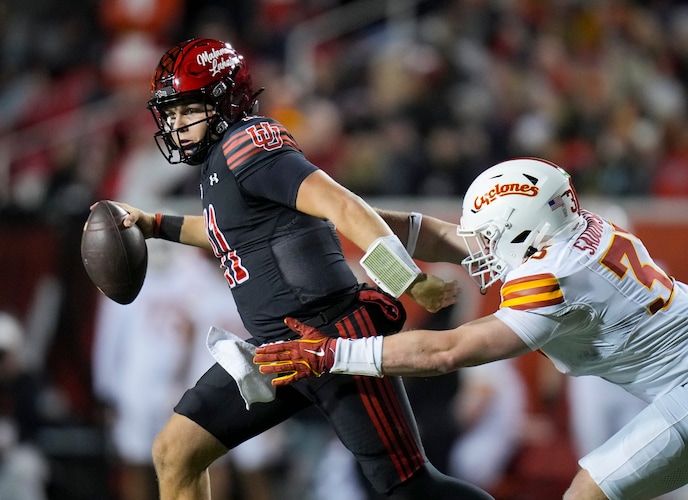The following conclusion is obvious, more apparent now than it’s ever been before. It’s both complicated and difficult. Some people think it’s a tragedy, signaling the demise of college football in particular and college sports as a whole. These days, it’s not original, but it’s not optional, either.
It just is.
If BYU and Utah want to be successful in the Big 12 and put themselves within a shout of the College Football Playoff every year or any year, there are a lot of things they should do, but one thing they must do, a single thing that has to not only be a priority, but a plain fact: Pay their frontline quarterback(s) a boatload of money.
If the Utes and Cougars want (like darn near everybody else) a top prospect … say, Ryder Lyons, the five-star prep quarterback out of Folsom, California and/or anyone like him … and they do, then do the song and dance and fork over the cash money.

(Bethany Baker | The Salt Lake Tribune) Utah Utes quarterback Isaac Wilson (11) looks to pass as he avoids a tackle from Iowa State Cyclones linebacker Jack Sadowsky V (33) during the game at Rice-Eccles Stadium in Salt Lake City on Saturday, Nov. 23, 2024.
That’s it. Pay for the most important thing. Something that isn’t discretionary. You might not like it. Coaches may not like it. Traditionalists might hate it. Kids who are working their tails off at part-time jobs to put themselves through school might be envious of it. But too, too bad. It’s risky, and it might not pan out as planned because these things are what almost all investments are: hit-and-miss. Some money spent is money wasted. No matter, it simply has to be done in nearly every — or every other — football recruiting class.
Offer enough NIL cash to draw in enough QB talent to win and win big. I’m talking millions here. Two, three, four, five. Whatever it takes. Don’t complain about it, don’t moan and groan about how noble — and under the table — it used to be, just find a way to pile up those resources to pull in that kind of talent. Here’s why: Without it, the Utes and Cougars are … they’re … they’re …
Well. Let me tell you a story.
Not long ago, I hurled out a question to a head coach during a private conversation. It wasn’t confidential private, just quiet, since we were the only ones on hand at the time: “What part of a college football team is the single most important?”
He paused for a moment, then said: “Not sure. I would probably pick either the offensive or defensive line.”
“C’mon,” I responded.
“I dunno, the kicker? That third phase is really a big deal.”
Now I knew he was goofing around.
Or maybe he was just being modest, considering he was a former college and NFL quarterback. Not just any college and NFL quarterback, but a star QB.
He knew full well the right answer all along because when I blurted out the obvious to him, that the quarterback position was by far the most important, he laughed and said: “All I know is, if you don’t have a good one, you’re dead. Absolutely dead.”
Not kind of dead. Not sort of dead. Not mostly dead. Dead dead.
Ain’t that the truth, and that’s not a question.
BYU and Utah are fine examples of what is so plain to see in the modern game.
(Trent Nelson | The Salt Lake Tribune) Utah quarterback Cam Rising poses for photos with faculty and students at Eastmont Middle School in Sandy on Tuesday, Nov. 28, 2023.
The Utes had been picked to win the Big 12 in their first go-round last season in the league, and what happened? Cam Rising got hurt, and after the first four wins, Utah lost seven in a row, collapsing without the man in place at the position from which he previously had led the Utes to league titles, knocked as he — and all of Utah football — was off their rails by injuries. What would Utah have done last season had Rising been able to play? Beats me. The Utes had other problems, too, none of them as significant as Rising’s absence. A good guess, then, would have been this: A whole lot better than they were.
BYU got mostly strong play from Jake Retzlaff, leading the Cougars to an 11-2 season. What happened in the two defeats? You already know: The QB threw a late interception in each that either eliminated or greatly reduced BYU’s chances for victory.
Even quality quarterbacks make mistakes, but mediocre ones kill seasons.
New Mexico Lobos quarterback Devon Dampier (4) during the first half of an NCAA college football game against Arizona Saturday, Aug. 31, 2024, in Tucson, Ariz. (AP Photo/Darryl Webb)
When football was being devised, I don’t think the first devisers meant for so much significance to end up at just one position, what with so many other athletes also playing roles. But as defenses got more sophisticated and coverage rules were altered, allowing more freedom for receivers to roam and offenses to become more explosive, the quarterback spot emerged as the greatest, most influential in all of team sports. More important than pitchers in baseball, goaltenders in hockey, centers in basketball. They became the key athletes, the key decision-makers, the key difference-makers, the actuators and the drivers of the most important aspect in all of football — putting points on the board.
I once had a memorable conversation with another coach, this one the late-great Mike Leach, about quarterback play. He went on and on about everything a quarterback has to do not just to win games, but also every time he comes to the line of scrimmage. Everything he had to do in practice the week before to properly prepare for coming to the line of scrimmage assured and making what happened thereafter a positive. Of the many processes, attributes and characteristics needed, arm strength was about 12th on the list. The rest of it was a bunch of mumbo-jumbo that reminded me of a calculus class I battled through in high school. Leach’s descriptions and instructions sounded more like trying to solve the Twin Prime Conjecture, not successfully completing a play-action pass.
Some coaches put more on their quarterbacks than others. But, in general, getting the ball to the right place at the right time for the right reason for the right result takes an athlete who is confident and skilled, aware and strong, and consistent and smart. And we haven’t even gotten to the leadership aspects, yet.
If the quarterback fails, the offense fails. If the offense fails, the team fails.
Everyone else has to contribute, has to do at least part of his part, but if the quarterback’s not stellar … uh-huh, you’re dead. Not sort of dead. Not kind of dead. Not mostly dead. No … all dead.
We get it. Great quarterbacks are in short supply and in demand. All the more reason to offer a promising quarterback or, if possible, quarterbacks — no matter how many stars are next to their names — whatever you can, whatever you have to. Pay them to please them, to pull them in. Make them rich young men, give them the training and the opportunity they need to succeed on the field, develop the daylights out of them.
If an investment flops, it flops. If a QB gets injured, he gets injured. If the coaches have a good enough eye and good enough instruction and the fates are with them, the investment pays off big. For BYU and Utah, the risk is worth the reward, and vice versa, mostly because in modern college football there is no other choice. Not if winning is the directive, the objective.
It’s as obvious as it isn’t optional.
It just is.









